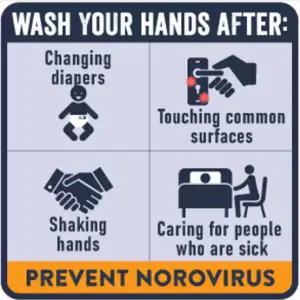Norovirus: What YOU Need to Know from the Wellesley Health Department
SPONSORED CONTENT: Across the country Norovirus (NLV) infections are spiking, nearly doubling in Massachusetts from this same time last year.
What IS NLV?
NLV is a HIGHLY contagious virus that causes vomiting and diarrhea and is very difficult to kill by traditional methods. NLV can linger for weeks on surfaces and can’t be killed by hand sanitizer or standard cleaners, even some that contain bleach (which may not be strong enough to be effective). Use a cleaner specifically labeled to kill Norovirus (see pic.) or a homemade bleach solution of 5 to 25 tablespoons of household bleach per gallon of water.

How is NLV spread?
NLV is spread by the “fecal oral” route, which means that germs from one person’s feces (stool)are inadvertently ingested by another person. This happens in a variety of ways:
- Having direct contact with someone with norovirus, like caring for them, sharing food or eating utensils with them, or eating food handled by them.
- Eating food or drinking liquids that are contaminated with norovirus.
- Touching contaminated objects or surfaces and then putting your unwashed fingers in your mouth.
- You can still spread norovirus for 2 weeks or more after you feel better.
What are the symptoms of NLV?
Nausea, vomiting, diarrhea, and abdominal cramps. Other symptoms can include headache, fever, and chills, and muscle aches. These symptoms usually begin 1-2 days after exposure to the virus and will last about 1-2 days in most people. Young children and older adults are more likely to get severe symptoms.
What should people do if they have NLV?
There is no specific treatment for NLV and most people get better without medical attention in 1-2 days. There is a risk for dehydration due to vomiting and diarrhea so it is important to drink plenty of fluids. If symptoms persist or worsen, contact your health care provider.
How can NLV be prevented from spreading?
Washing your hands thoroughly with soap and warm water before eating or preparing food, after using the toilet, and after changing diapers can help reduce your risk for NLV.

- If you have NLV, do not prepare, handle food, or care for others. Wait at least 2 days (48 hours) after symptoms stop. This is important if you work in a restaurant, school, daycare, long-term care facility, or other places where you may expose people to norovirus.
- Cook your food completely. Wash all fruits and vegetables.
- After episodes of vomiting or diarrhea, clean contaminated surfaces immediately with a bleach-based household cleaner.
- If you are taking care of someone who has vomited or who has diarrhea, wash your hands with plenty of soap and warm water after cleaning the bathroom, helping the person use the toilet, or changing diapers, soiled clothes or soiled sheets. If possible, wear rubber or disposable gloves when cleaning.
- Regularly clean bathroom surfaces such as toilet seats, sink surfaces, faucet handles and doorknobs.
- If you or your child has persistent or severe vomiting or diarrhea (with or without a fever), signs of dehydration (such as dizziness, decreased urine output or severe weakness), call your health care provider for advice.
For more information about Norovirus, visit our website at www.wellesleyma.gov/health